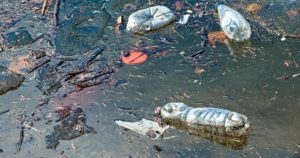By Taylor Avery of Food & Water Watch
 Across the globe, people purchase about 20,000 plastic bottles every second. The vast majority of these bottles are not recycled and end up in landfills or in the ocean. It’s escalating into a major environmental crisis, and the fossil fuel industry is partially to blame.
Across the globe, people purchase about 20,000 plastic bottles every second. The vast majority of these bottles are not recycled and end up in landfills or in the ocean. It’s escalating into a major environmental crisis, and the fossil fuel industry is partially to blame.
While many of these bottles are made out of polyethylene terephthalate (PET), a highly recyclable material, efforts to recycle fail to keep up with the growing rate at which people use plastic bottles. Moreover, major food corporations continue to manufacture demand for soda and bottled water, packaged mainly in plastic, which takes hundreds of years to decompose.
In 2010, nearly 200 coastal countries generated over 275 million tons of plastic waste. In 2016, 480 billion tons of plastic drinking bottles were sold across the world. A report conducted by the National Association for PET Container Resources (NAPCOR) found only about 30 percent of PET bottles in the U.S. (most bottled water bottles) were recycled in 2015. Major drink brands like Coca-Cola produce the greatest number of plastic bottles, but the top six beverage companies package their products in bottles that use very little recycled PET. That mostly unrecycled plastic ends up in the ocean where it is consumed by wildlife.
Another recent study found that 59 percent of seabird species have ingested plastic and have plastic debris in their organs, and it’s projected that 99 percent of all seabird species will have ingested plastic by 2050. Plymouth University conducted a study that found one third of UK-caught fish contained plastic. This means plastic is not only polluting our environment, but it is also putting human health in danger.
Fracked Gas’s Role in Plastics
The pollution caused by plastic doesn’t just come from the drink industry. INEOS is a chemical company that ships fracked hydrocarbons from the U.S. across the Atlantic to be converted into plastics. Wall Street investor-funded US fracking produced an oversupply of cheap gas and ethane in the past few years. Ethane is a hydrocarbon present in gas and a primary raw material for petrochemical manufacturing. Most of the plastic created from ethane is used in packaging such as beverage bottles.
That means it’s not just major food and beverage corporations that profit from the destruction of the planet brought on by plastics pollution. Companies like INEOS are financially gaining from destroying our environment through fracking and manufacturing plastic. We are already aware of the danger of fracking but that danger also flows into plastic manufacturing, further damaging our water, land, and air. In order to preserve our oceans and our planet, major corporations need to stop exploiting our natural resources for profit, and that means putting an end to fracking and bottled water for good.
Taylor Avery is a summer communications intern at Food & Water Watch.


